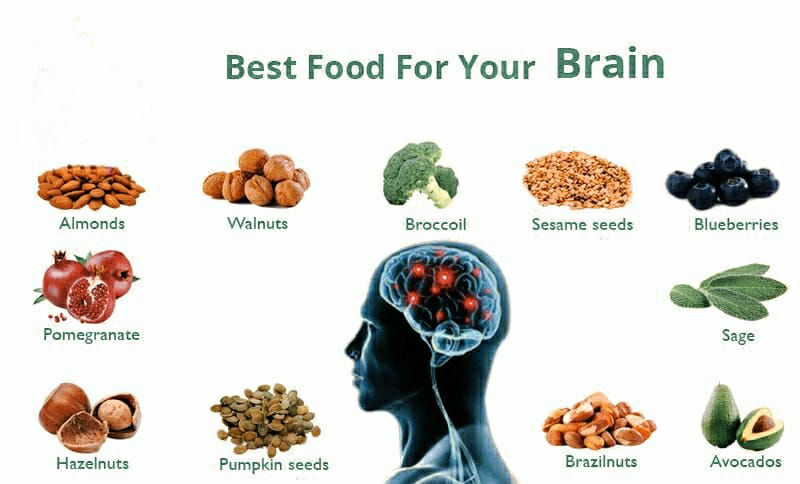
Do you know your food can affect your mood drastically? It is crucially very important to improve your diet and food intake that you take to boost your mental health.
We are all aware of the advantages of eating fresh, healthy food for our bodies, but what about our minds? See our top seven recommendations to help you fuel your brain and enhance your mental wellness.
Your diet has an impact on hows well your brain functions and can enhance some mental abilities like memory and concentration.
Brain Foods are like those foods which help your brain.

For the creation of new proteins, cells, and tissues in your brain and nervous system, nutrition is essential. Your body needs a variety of carbohydrates, proteins, and minerals to function properly. Instead of eating the same meals every day, dietitians advise eating meals and snacks that include a diversity of foods to acquire all the nutrients that enhance mental efficiency.
You can receive energy from complex carbohydrates like brown rice and starchy veggies. More nutritious and longer lasting than sugar and candy's simple carbs are foods like quinoa, millet, beets, and sweet potatoes.
Lean proteins give your body the energy it needs to think and respond fast. Chicken, meat, fish, eggs, soybeans, nuts, and seeds are good sources of protein.
The normal operation of your brain and neurological system depends on fatty acids. They can be found in flaxseeds, fish, meat, eggs, and dairy products.
List of 7 items essential for your mental health.
1. Yogurt or curd

If you've ever highlighted yogurt's benefits for vomiting, you might be doing yourself more of a favor than you realize. The probiotics contained in yogurt can also improve a person's mental health by helping to reduce levels of stress, anxiety, and depression. Many individuals love yogurt for the extra benefit of probiotics, which support a healthy digestive system.
2. Walnuts
Antioxidants included in walnuts aid to prevent oxidation in the body and brain. Even more astoundingly, these nuts can also promote the development of new neurons. In other words, walnuts can help us create new brain cells, which is crucial for preserving mental health.
3. Beans
Beans and legumes, such as chickpeas, lentils, and kidney beans, are rich in fiber and antioxidants and help you feel satisfied for longer while maintaining blood sugar stability and increasing energy expenditure (which, as we know is essential for good mental health). Additionally, beans contain thiamine, a nutrient required for acetylcholine synthesis (the neurotransmitter essential for memory).
4. Fish or fatty fish
Seafood is an excellent supplier of omega-3 fatty acids. Your brain is made up of fat to an extent of 60%, and omega-3 fatty acids make up 50% of that fat.
5. Coffee
Caffeine and antioxidants, two major components of coffee, can boost brain health.
Coffee's caffeine has a variety of advantageous benefits on the brain, including heightened attentiveness. By preventing the chemical messenger adenosine, which makes you feel tired, caffeine keeps your brain attentive.
mood improvement Additionally, caffeine may increase dopamine and other "feel-good" neurotransmitters in your body.
Long-term coffee use has also been associated with a lower risk of neurological conditions including Parkinson's and Alzheimer's. Adults who drink 3–4 cups daily showed the greatest risk reduction.
6. Turmeric
The active component of turmeric, curcumin, has been demonstrated to pass the blood-brain barrier, allowing it to reach the brain and help its cells directly.
It is a strong anti-inflammatory and antioxidant substance that has been connected to the following advantages for the brain:
the memory may be enhanced. Alzheimer's patients who use turmeric may see memory improvements. It might also assist in removing the amyloid plaques that are a defining feature of this disease.
minimizes depression Serotonin and dopamine are both elevated by curcumin, which elevates mood. When combined with normal therapy, curcumin may help persons with depression and anxiety symptoms.
7. Dark chocolate

An antioxidant called flavonoids is abundant in dark chocolate. It has been demonstrated to improve mood, improve concentration, and memory, and aid older persons battle cognitive decline. Just keep in mind that you should still limit your intake of chocolate.
Some healthy eating habits.

1. Drink water
Make it your mission to replace sugar-sweetened beverages with water. Write down how frequently you will make this decision, for example, five times a week, to make it more quantifiable.
2. Stick to one serving method
Eating one dish will assist those of us who enjoy getting seconds in controlling our calorie consumption. Set a goal for yourself to adhere to one serving and typical portion sizes.
3. Eat mindfully

Your brain doesn't signal that you are full for roughly 20 minutes. Eat gradually. Spend a little more time observing what and how much we are eating. Write down how frequently you will try to take at least a half-hour to eat your meal to make this more measurable.
Conclusion.

When you're hungry, eat something healthful like fruit, almonds, hard-boiled eggs, baked sweet potatoes, or edamame. You'll have more energy from this than from packaged goods.
Make a sensible grocery list and follow it.
Avoid shopping when you're hungry since you're more likely to make bad impulsive purchases.
Consider where and when you will eat. Avoid eating in front of the television because it can distract you and make you eat too much. Instead, choose a seat, unwind, and pay close attention to what you're eating. Chew gradually. Enjoy the flavor and feel.
When you decide to seek help, schedule an appointment with Dr. Bakshi.
Click 'BOOK NOW' to book your appointment.


Comentários